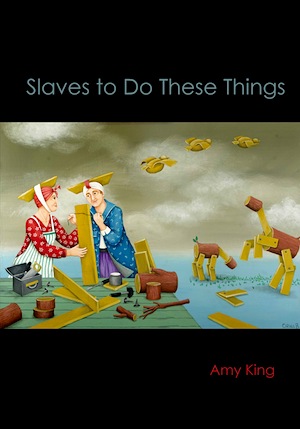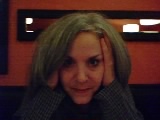
| Jacket 40 — Late 2010 | Jacket 40 Contents | Jacket Homepage | Search Jacket |
This piece is about 4 printed pages long.
It is copyright © Bobbi Lurie and Jacket magazine 2010. See our [»»] Copyright notice.
The Internet address of this page is http://jacketmagazine.com/40/r-king-rb-lurie.shtml
Amy King
Slaves to Do These Things
reviewed by
Bobbi Lurie
Blazevox

1
Walt Whitman wrote, “I am large. I contain multitudes...For every atom belonging to me as good belongs to you.” Amy King writes, “I’m portable. My mind travels/ the verse and valleys of whole people./ I’m at its heels, the grabbing of long/ white trains and veils,/ using their hats for sleds.” Quick to introduce a new fragment in the poem, “The Taste Of Light & Our Digestive Tracks,” from her new book, “Slaves to Do These Things,” King continues the stanza with, “Africa is one season without snow.”
2
Amy King’s poems are dense and energetically written. They are often fragmented collages of narratives which are in no way narratives in the usual sense. They express a great deal of movement of the mind, written with a strong imagination and unexpected twists. The structure of her poems are consistently rendered as if to help contain a wild mind.
3
King’s knowledge of writers and artists is obviously vast. She has the courage to include references not readily understood. She touches upon them lightly. She is certainly not one of the slaves in the title of her book. She is the magician artist who removes time from her narrative. In one poem, “Failed To Include,” she writes of today’s weather in one stanza and goes on to describe a day, including present-day people but is unafraid to start a new stanza with:
4
Now, a year before
the end of the war, Claude
Cahun began
her literary studies. She
wrote the very first
lecture she heard, Lucy Renee’s
“Essence of the Tragic”
attended in the company
of fellow students,
all of them persons
with war injuries.
She culled her amputee notes.
5
Claude Cahun was one of the few women to participate in the Surrealist movement of the 1920s and 1930s. Her photographs, writings and general life question gender, attempting to dissolve their borders, calling into question the concept of one true identity. King brings Cahun into present time in the next stanza:
6
The suicides stood
experiments; we became a part
of the kitten
background, wallpaper mists
of who held what
body cut with what flesh
desired and parched in the name
of what fascist cause in this day
and country would allow that brand
of you must be the better
me fundamental song.
7
In a later stanza she writes:
8
Cindy, Nan, and Diane brought
the humming photographs
to beds, window closets,
that the seeds of the kingdom
come from the pupil. Prison dilated
CC’s altered she, ushered
chameleon people of the female
to cradles, through kitchens
and the iris backwashing the tomb.
9
Cindy Sherman, Nan Goldin and Diane Arbus are all photographers who were pupils of Cahun’s (whether they knew it or not since Cahun’s stunning work has only recently become known) and their kingdom was and is, like Cahun’s, from the pupil, the eye.
10
Some of King’s poems, like “State of a Nation,” have a cinematic quality which follows a trajectory arriving at its rightful reality before leaping off into another:
11
The actor is a second life
of people drawn
on the achievable with fiction.
The characters are fleeting
when an actor’s flame
blows the shortest immortality.
As a result, great achievements
are limited to audience.
But the audience pants on.
Saliva glows on the mouths’
cornered sounds.
12
“Slaves to Do These Things,” is divided into five “acts” introduced by quotes from Cesar Vallejo, Betty Smith, Claude Cahun, Dora Maar and Virgil. In Act I, the quote from Cesar Vallejo, “The soul that suffered from being its body… ” is followed by a poem titled “The Psalms Called “Breath” where King examines human suffering and injustice while sticking to the visual images which empower her work. A portion of “The Psalms Called “Breath” illustrates how the soul does suffer from being its body… .
13
… Mother Mary, O contrary,
why do you never exist? Why
the business of insisting
a fear of eternal flames
from hollow fangs that
would render the spirit deaf?
Our love flowers the cockroach
of death into augured cues
of eggplant eyes,
strangled to be alive. We play life
until delivered, and then
turn swirling puddles
of earthworm guts
into every cell the boots collect
by the steps
of soldiers, teachers
and journalists. We are everywhere
terrorists, suicide failures, half-
rolled against the fence of a homeless
drifter, beaten dirt knapsacks
to carry our buttons and heat…
14
Later in the poem, we are confronted with lines which take us somewhere entirely different:
15
We peyote for fullness and eat
cameras to claim the mercy
of a bacterial armpit safari.
16
Act III begins with a quote from Claude Cahun , “Selling one’s soul to God; is to betray the Other” and the first poem in this section is exquisitely titled, “The Fear Of Hope Is Also Beautiful.” But, as often happens in King’s poems, the poem’s title does not give away its contents. As the poem proceeds King writes:
17
The fear of hope is also beautiful
as we tread along
finding several sharks
swimming in place.
To combat the brutality of eyes
that take in these sights,
why don’t you tug at the knots
of your wrist with your teeth
and say amen to all of the above,
draw the shades aside and lean
below the waist,
wrapped in cloudless curtains
where we will bathe in the salts
of an iron water, swollen
awake with all that hurt us.
18
In her poem, “When The Bread Is In My Body,” King writes:
19
My eyes are heavy
But my heart is not.
My heart is now.
20
This nowness of the heart very much describes many aspects of “Slaves to Do These Things.” The heart is now. We are alive in the now. This book is alive in the now, dynamically filled with the presence of the senses, with alterations in thoughts as they appear in the mind which can be interpreted in multiple ways along with the joy of rhyme, reason and non-reason. This is a book which invites multiple readings.

Bobbi Lurie
Bobbi Lurie’s third poetry collection, Grief suite, will be published by CW Books in May, 2010. Her other collections are The Book I Never Read and Letter from the Lawn.